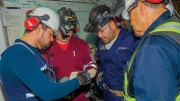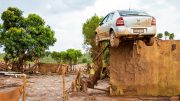The future of Quebec’s uranium industry remains up in the air, after the province’s environmental agency released a report concluding it would be “inappropriate” to allow uranium development — at least for now.
The Bureau d’audiences publiques sur l’environnement (BAPE) was tasked with studying uranium mining in the province last March.
BAPE based its report on more than 250 written submissions and dozens of public meetings, and presented it in July to the provincial government, which is now examining the 600-page document.
BAPE concludes in the report that uncertainty around the health and environmental risks of uranium mining and radioactive uranium waste in particular means that allowing uranium development now would be “premature.”
“Because of the uncertainties, gaps and sometimes major limitations in scientific and technical knowledge, there is no social or political consensus on the issue, and this has led to a low level of acceptability in Quebec,” the report reads.
BAPE also noted that “the uranium industry is rejected almost unanimously by the aboriginal communities in territories subject to land claim agreements in James Bay and Nunavik, and in southern Quebec.”
In a release, Quebec’s mining association (the Association minière du Québec, or AMQ) notes that modern uranium mining does not pose a significant risk to human health, due to strict control of exposure levels, which are low.
“Saskatchewan’s experience shows that it is possible to properly operate a uranium mine, adhering to the best practices recognized worldwide, and reap important benefits for socio-economic development of Quebec, while respecting people and the environment,” AMQ president and CEO Josée Méthot says.
The AMQ took comfort in federal Environment Minister David Heurtel’s announcement that an inter-ministerial committee would examine the report in depth before deciding on the future of the province’s uranium industry.
While the report recommended against allowing uranium development in the near-term, it noted the government should think carefully before barring it.
“Because of its potential legal and economic impacts, such a decision should not be made in haste, so as to minimize its costs.”
The province is already facing a $190-million lawsuit by Strateco Resources (US-OTC: SRSIF), which holds the Matoush uranium project in Quebec. The project has been in limbo, as the province’s attitude toward uranium exploration has changed from encouraging to arguably hostile over several years.
If the government allows uranium mining, the report pointed to three requirements.
First, it would need to ensure the industry’s “social acceptability” in the province.
Second, it must address the uncertainties associated with uranium mining. “It must work hard, over a long period, to generate enough reliable knowledge to overcome existing scientific gaps and technological uncertainties,” the report says.
Lastly, the provincial government needs to develop a legal framework “more compatible with the respective missions of its departments,” and enter into an agreement with the federal government that will give it control of uranium operations.




Be the first to comment on "BAPE report advises against uranium mining in Quebec"